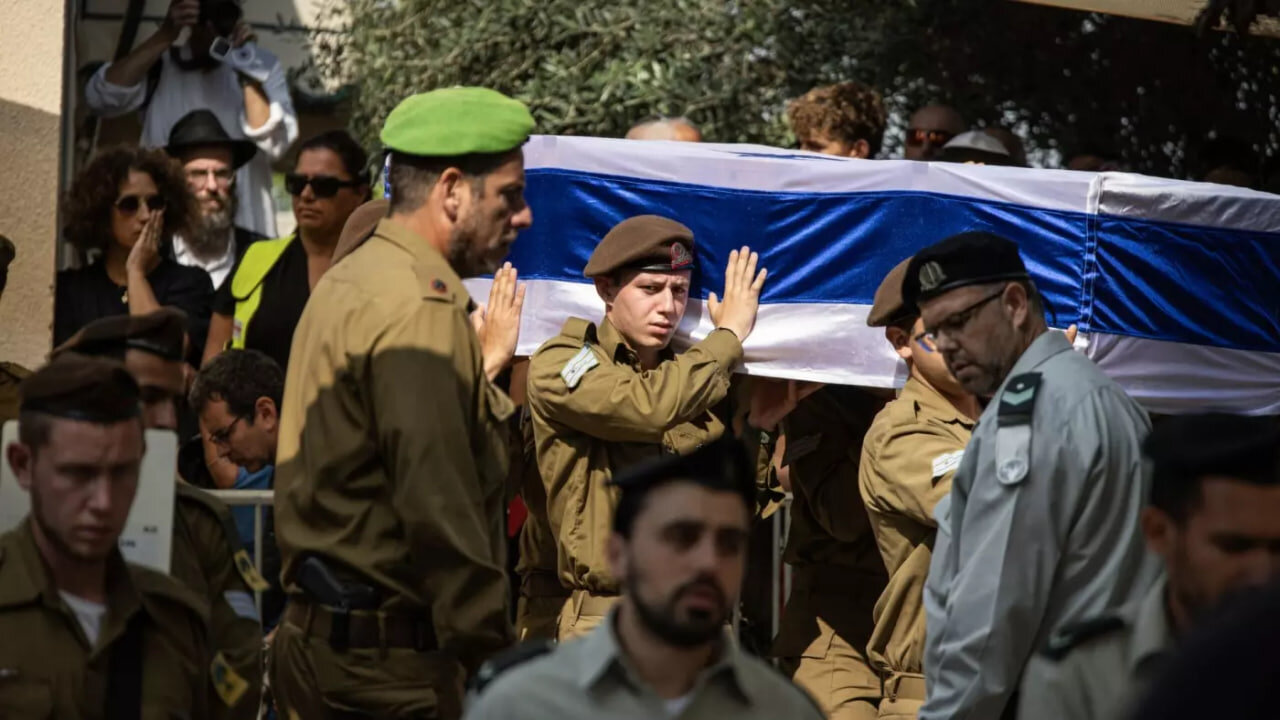Israeli forces in Lebanon and Gaza suffer deadliest month of 2024

Israel has recorded its worst month for military deaths this year amid continuing fierce fighting in southern Lebanon and northern Gaza.
At least 62 soldiers have been killed since the start of October, according to official figures, making this the deadliest month for the Israeli military since last December when 110 soldiers were killed at the height of its war against Hamas in Gaza.
It also marks a steep increase in recorded fatalities compared with recent months. Just nine deaths were recorded by the Israeli military in September, and 63 in total between June and August.
At least 35 Israeli soldiers have been killed in southern Lebanon or on the Lebanese border since Israel invaded its northern neighbor at the start of the month in an escalation of its war against Hezbollah. The Lebanese group has said it has killed more than 90 Israeli soldiers, although these figures are unverified.
At least 19 soldiers have also died this month in continuing fighting with Hamas in Gaza, where Israel is accused of carrying out a campaign of ethnic cleansing and extermination against Palestinians trapped in the north of the enclave.
The figures are based on official information published on the Israeli Ministry of Foreign Affairs website listing a total of 780 military casualties including hundreds killed during the 7 October 2023 Hamas-led attacks in southern Israel.
It includes at least 365 soldiers listed as "fallen in combat" in Gaza, Lebanon and the occupied West Bank, as well as those killed in rocket attacks or other attacks within Israel, and others who died in road accidents. But many soldiers are identified only by their name, rank and unit with no further detail about the circumstances of their deaths.
New figures released this week by the Israeli military’s rehabilitation department also appear to suggest a recent increase in the number of wounded soldiers requiring medical treatment. On Tuesday, it said it had received 910 soldiers wounded this month in Lebanon.
Information about casualties is tightly controlled in Israel where the media is subjected to strict military censorship. That has led some to question whether official figures may be under-reporting the real scale of losses suffered by Israeli forces in Gaza and Lebanon.
Information about casualties is tightly controlled in Israel where the media is subjected to strict military censorship. That has led some to question whether official figures may be under-reporting the real scale of losses suffered by Israeli forces in Gaza and Lebanon.
In an interview on Channel 12 on Monday, opposition leader Yair Lapid said that 890 soldiers had been killed and 11,000 injured since 7 October last year.
“There are limits to how much we accept the alternative facts,” Lapid said.
Defending his own figures, although without citing a source, Lapid referred to Israeli hospitals where wounded soldiers are being treated: “If you have doubts about this figure go to Tel Hashomer, go to Ichilov, go to Rambam, go the rehabilitation departments.”
In its latest figures released on Tuesday, the Israeli military’s rehabilitation department updated the total number of soldiers it said had received treatment since 7 October last year to about 12,000.
About 14 percent of these – around 1,680 soldiers – are classified as having moderate or serious injuries. About 43 percent – 5,200 soldiers – required treatment for post-traumatic stress disorder or other psychological issues, the department said.
Widows and orphans
Meanwhile, news reports on the funerals of soldiers killed in Lebanon have focused public attention on the grieving of widows and orphans and led some to wonder whether popular support for Israel’s wars may be shifting.
Writing in Haaretz on Monday, Amos Harel asked whether a rising death toll could “gradually change the public’s view of the need to continue the war”, as had happened following previous Israeli operations in Lebanon and Gaza.
Last Tuesday, Israeli Prime Minister Benjamin Netanyahu was reported to have held a meeting of army officials and government ministers to discuss the possibility of a ceasefire in Lebanon.
One senior security official told the Ynet website that army chiefs already believe they are nearing the end of their operation in Lebanon.
“It’s either an arrangement or a war of attrition and a security zone,” the official was quoted as saying.
Israeli journalist Meron Rapoport told Middle East Eye that he believed that apparent shift in the army’s position was based on its concerns that casualties would continue to increase as long as combat operations continued.
“If the army now says the war must end it is because of the dead,” said Rapoport.
“They say it's to preserve the ‘achievements’ in Lebanon but in my opinion it’s because of the fear of an increase in the number of casualties and an erosion of public support.”
Israel has so far showed no sign of relenting in its bombing campaign of Lebanon which has killed about 3000 people in the past year and displaced more than one million.
Many remain deeply pessimistic about the prospect of any imminent end to the wider war, particularly in Gaza where more than 43,000 Palestinians have so far been killed, according to the Palestinian health ministry.
Abed Abu Shihada, a Palestinian writer and analyst based in Jaffa, pointed to the influence and presence within both Netanyahu’s coalition government and the Israeli military of far-right parties and supporters of the settler movement which has declared its intention to build settlements in Gaza.
“For them this is a religious war and they speak in the language of doing God’s mission,” Abu Shihada told MEE.
“There are no serious voices to end the war. Israeli society is depressed but still they want to continue the fighting. They may approach an agreement with Lebanon, but not in Gaza. I don’t see any scenario ending the war in Gaza, even if the price was high.”
Leave a Comment